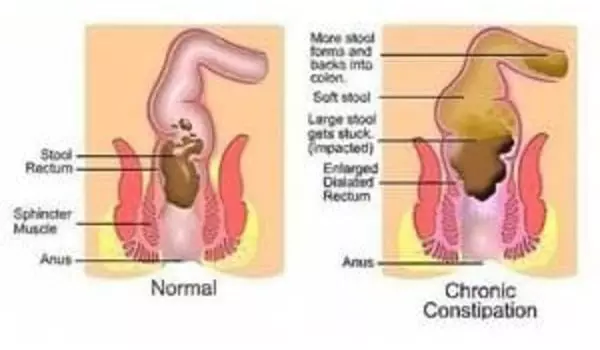
Dr. Rajendra Sonavane
M.S.,F.I.C.S.,F.I.A.G.E.S.,F.I.S.C.P.
Certified training in LASER surgery, Germany & Poland
What is Constipation?

The food that we eat is digested in the small intestines and nutrients get absorbed there. What remains is the waste that is passed through the large intestine. This waste is the stools. The quality of stools, texture, etc. is determined on what we eat. When a person is unable to have at least three bowel movements in a week, it is medically termed constipation. Anyone can experience constipation occasionally, but when it becomes a regular phenomenon coupled with other symptoms like hard stools, pain during evacuation, feeling of incomplete motions, and change in frequency and shape of stools (ribbon-like), it is sign of constipation.
Constipation can interfere with one’s routine tasks and quality of life; in such circumstances; it is advisable to talk to a doctor, rather than popping over-the-counter medicines.
What are the signs and symptoms of constipation?
Following are the complaints of a patient of constipation:-
- Less than three motions in a week
- Pain and strain while passing stools
- Feeling of incomplete evacuation
- Bloating, heaviness in stomach, loss of appetite and sometimes nausea
- Hard stools
- Difficulty in passing stools, sometimes one needs to pull out manually(finger evacuation)
- Foul smelling stools and flatulence
What are the Causes of Constipation?
Often constipation can be a lifestyle problem but in some cases, it could be genetic or have some serious underlying cause:
- Consumption of junk food and low intake of fibre-rich food (e.g. fruits and vegetables)
- Irregular meals
- Lack of exercise and sedentary lifestyle
- Obesity
- Avoid passing stools when there is an urge
- Hormonal medicines, iron supplements, anti-depressants, etc.
- Inflammatory bowel syndrome, hypothyroidism
- In rare cases, absence of intestinal flora due to dysbacteriosis, can cause constipation
- There can be underlying cause like bowel cancer, Crohn’s disease, Obstructed Defecation Syndrome, spinal cord injuries, etc.
When do you need to see the doctor?
Often, patients try self-medication or simply ignore the signs. An occasional constipation is no cause for worry. However, when constipation is more often and has other symptoms along with constipation like bloating, abdominal pain, change in frequency or size (ribbon-like) of bowel movement, blood in stools, nausea, etc. it is advisable to check with your doctor.
How does a doctor diagnose constipation and its cause?
Doctors at Proctocare clinic will take detailed clinical history and based on your bowel history, lifestyle and dietary preferences, will diagnose the problem.
At Proctocare Clinic, we have advance methods of investigation like
- Video Proctoscopy
- Colonoscopy (to study the lower part of the bowel)
- Anal Manometry
- MR Defecography
How is constipation treated?
- Medicines
- Change in dietary habits and lifestyle modifications.
- Biofeedback (non-invasive procedure where a probe in inserted into rectum and muscle movement is studied and patient is guided to improve the defecation movement)
- Starr Surgery (in case of obstructed defecation syndrome and rectal prolapse)
What happens if constipation is left untreated?
Chronic constipation if left untreated, can cause complications like
- Haemorrhoids (Piles)
- Fissure in ano / Anal fissure
- Rectal prolapse
- Fecal Impaction